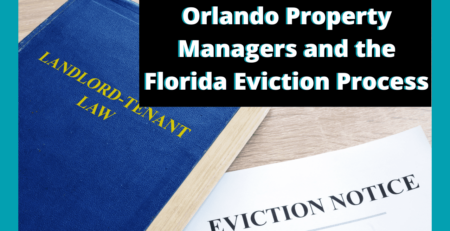Latest Updates to the Fair Housing Act and Other Real Estate Laws
The Florida Fair Housing Act (Florida Statutes §760.20-760.37) reflects and incorporates the federal Fair Housing Act and is enforced by the Florida Commission on Human Relations (FCHR). If the commission receives a complaint from an applicant or a tenant, they will investigate your alleged housing discrimination on behalf of the state of Florida.
Orlando rental property owners face many federal fair housing laws that must be complied with throughout the leasing and management process. The state laws are exactly the same; you cannot discriminate against someone based on one of the protected characteristics.
It’s important that you’re thinking about these laws during the marketing and advertising process as well as the application process and throughout the tenancy. Fair housing laws must always be on your mind and written into your procedures.
Fair housing violations are expensive and they’ll also seriously damage your reputation as a landlord. Make sure you understand fair housing requirements so you can avoid potential risk, liability, and lawsuits.
Federal and State Fair Housing Laws
The Federal Fair Housing Act makes housing discrimination illegal when it comes to the sale, rental, or financing of homes. It also protects consumers who are obtaining insurance or other housing-related professional services.
The U.S. Department of Housing and Urban Development (HUD) enforces the Fair Housing Act by investigating complaints from individuals and community organization across the country. If HUD determines that housing discrimination has occurred, the U.S. Department of Justice, Civil Rights Division can bring the case to Federal Court. The maximum penalty currently for your first offense is $16,000.
Discrimination and Fair Housing for Orlando Rentals
The federal Fair Housing Act prevents you from discriminating against tenants or applicants based on:
- Color
- Race
- Disability
- Familial status
- National origin
- Religion
- Sex
These are considered “protected classes,” and you need to be aware of the potentially discriminatory language that’s often used as well as practices that are inconsistent or unfair. You may not intentionally discriminate against someone for any of these reasons, but mistakes are easy to make. Be cautious, and always work with an Orlando property manager if you’re in doubt about how you should proceed.
The Florida Fair Housing Act does not provide new protected traits. Some counties may have additional protections in Florida, and Orange County fair housing laws are addressed in the municipal code section on Human Rights. According to the local law, discrimination is also prohibited based on sexual orientation, marital status, and age.
State and federal fair housing laws allow tenants to file a housing discrimination complaint through HUD or through a local enforcement agency like the FCHR within a year of when the last act of discrimination occurred. Tenants are also given two years from when the last act of discrimination occurred to file a housing discrimination complaint in Federal Court if they would prefer to not put their complaint through a state agency.
What does this mean for you as a landlord? It means that you cannot ask certain questions during the showing or screening process. You are not allowed to ask potential renters how many kids they have or whether they have a disability. You cannot ask how old they are or “where they come from.”
Some of your inquiries may seem innocent to you. It may seem strange that you cannot say your property is “perfect for single professionals” when you’re advertising a studio condo in downtown Orlando. But, that type of language is discriminatory. It could lead to a complaint.
Fair Housing and Advertising an Orlando Rental Home
We’ve talked a little about the language you can and cannot use when advertising your property. However, it’s important to really understand how easy it is to make a fair housing mistake without intending to. A simple question or an off-hand remark could make a tenant feel like you would not be treating them fairly in the application process or during the tenancy.
Here’s what you need to know.
Marketing is important, and it has to be strategic. This is how you attract tenants to your property. To rent out your property quickly to great tenants and for the most amount of money, you want to launch an aggressive marketing campaign. That’s a good idea. Just make sure all of your listings, marketing materials, and signs comply with fair housing laws.
When you’re marketing your rental home, here are the details you can lawfully include in your listing:
- How large the home is – how many square feet it has, how many bedrooms and bathrooms there are inside of the property, and whether there’s outdoor space.
- The amount of rent and how much of a security deposit will be collected.
- When the home will be ready for move-in.
- Benefits of the home itself; good lighting, great location, updated kitchen, hurricane shutters, a fenced backyard, etc.
You cannot use language that indicates you are looking for a particular type of tenant. You cannot say anything that references any of those protected classes that we’ve been discussing.
Do not say that your property is close to churches or mosques or synagogues. Do not say it’s perfect for families. Don’t call it a bachelor pad. This is the type of language that can get you in trouble because it may be seen as discriminatory against several of the law’s protected classes.
Keep your rental property marketing accessible to everyone who is qualified to rent your home. You want to cast a wide net when you’re attracting people to your listing. So, focus on what the property offers to everyone. Don’t make assumptions about who would want to live there and don’t talk about the types of tenants you would prefer.
Screening Orlando Tenants with Fair Housing in Mind
How can you avoid the appearance of discrimination when you’re screening Orlando tenants?
There’s one thing that will protect you during this process: a set of standard rental criteria or qualifications. Put these criteria in writing and provide it to any tenant who is interested in filling out an application. Then, make sure you follow your own standards consistently every time you screen a potential tenant.
The more you automate your screening process, the more you’re able to protect yourself. A landlord who sits down and manually looks into the background of each applicant will likely fall back on assumptions and prejudices that they don’t even realize they have. When you’re using technology, software, and a third-party screening company, you’re not in danger of letting your personal opinions and preferences creep in. Everything is consistent and automated.
To remain compliant with state and federal fair housing laws, you must screen each application against the same requirements. Denying one applicant because of a 580 credit score is not going to hold up in court if the tenant you eventually place has a 550 credit score. Be consistent and document the entire process.
Set up the standards you seek in terms of credit, income, criminal history, and rental references. This will make it easy for you to move through the application process because you’ll know exactly who is approved and who is not just by looking at the data. It’s objective and protects you against any potential claims of discrimination.
Don’t forget to follow the Fair Credit Reporting Act guidelines when you approve or deny a tenant. The denial needs to be in writing, and specific language must be included, especially if the denial is due to credit criteria.
Fair Housing Law Updates: Service and Companion Animals
 The area of fair housing law that is changing the most is probably the area of disabilities. Tenants who have a physical, intellectual, or emotional disability are changing the way landlords are required to work with animals. This is an area of the law that is always evolving, and you need to stay up to date as best you can.
The area of fair housing law that is changing the most is probably the area of disabilities. Tenants who have a physical, intellectual, or emotional disability are changing the way landlords are required to work with animals. This is an area of the law that is always evolving, and you need to stay up to date as best you can.
As a landlord, you have the choice to allow pets or not allow pets in your Orlando rental property. There are no laws on the books that protect pet owners. You can put together a strong pet policy or you can simply say a firm no to any and all pets.
However, you cannot deny tenants with service or support animals. The fair housing laws do not consider those animals to be pets. They are, instead, accommodations. They are to be treated less like pets and more like wheelchair ramps or shower seats.
This means you have to allow service animals and companion animals. It also means you cannot charge a pet fee or pet rent.
Service animals are dogs. Companion animals can be any type of animal and they are often emotional support animals that help people cope. There are different ways to approach each class of animal.
Fair housing laws can be difficult to navigate, and they change frequently. If you don’t have the time or resources to stay up to date on these requirements, get help from a professional Orlando property management company so you can adequately protect yourself and your investment.
Please don’t hesitate to contact us at Homevest Management if you’re struggling with fair housing questions. We provide expert Orlando property management, real estate, property rentals, and HOA management serving all of Central Florida, including Winter Garden, Doctor Phillips, Baldwin Park, Winter Springs, and Windermere.











